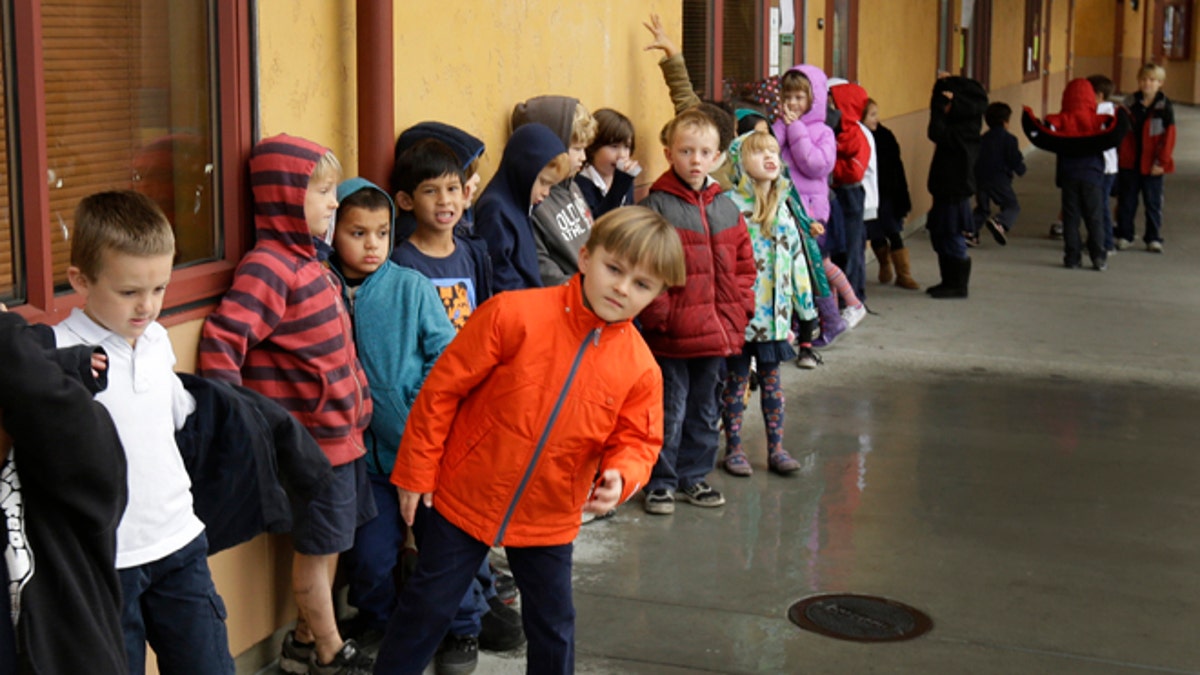
Jan. 24, 2013: A first grade class of 30 children waits to enter a classroom at the Willow Glenn Elementary School in San Jose, Calif. (AP)
Kids who feel accepted and supported by their peers “no matter what” are less likely to have negative feelings about themselves after a setback, new research suggests.
Kids in the study who spent time thinking about how they had felt accepted and valued by their peers, even when they made mistakes, were less likely to feel badly about themselves after getting poor grades three weeks later.
“Our findings suggest that it is important for students’ self-feelings to feel accepted and valued unconditionally,” Eddie Brummelman told Reuters Health in an email.
“If students don’t feel accepted and valued unconditionally, they might be prone to negative self-feelings, such as shame and insecurity, when they perform poorly,” said Brummelman, who’s now at the University of Amsterdam in The Netherlands.
While he was still at Utrecht University, also in The Netherlands, he and his colleagues invited youngsters to reflect for 15 minutes on personal experiences of “unconditional regard” from others.
“Unconditional regard” makes people feel accepted and supported no matter what they say or do.
“We hypothesized that this exercise would imbue students with the feeling of being valued for who they are, even when they perform poorly,” Brummelman said.
He added, “One 13-year old girl in the study described (unconditional regard) as ‘Whatever I say, whatever I do, whatever I ask, they will always accept me.”
The researchers did not study the actual provision of unconditional regard, but rather how reflecting upon prior experiences of unconditional regard from peers could affect the participants.
They randomly assigned 247 students, ages 11 to 15, to one of three groups. One group was told to think of peers who provide unconditional regard, and then to recall a time when their peers accepted and valued them even when they “made a mistake or did something stupid.”
The second group was told to think about peers who only accept and value them under certain conditions, and then to recall a time when they had made a mistake and felt less valued and accepted because of it.
A third group was told to think about a time they made a mistake in front of students they didn’t know.
“We studied this in early adolescence—a time when negative self-feelings peak and when children often experience conditional regard from peers,” Brummelman said.
Three weeks later, after receiving their first report cards of the school year, the children reported their feelings about themselves.
In general, children with lower grades had more negative self-feelings.
But this wasn’t as true for children who completed the unconditional-regard exercise. “Children who had reflected upon unconditional regard did not experience increased negative self-feelings after receiving low grades,” Brummelman said.
Brummelman said some scholars think students should feel badly about themselves after performing poorly, so they avoid such performance in the future, but the new study findings suggest otherwise.
“The unconditional-regard exercise buffered negative self-feelings after receiving low grades, but it did not undermine subsequent academic performance,” Brummelman said.
Unconditional regard does not imply holding low standards for the child, he emphasized.
“It implies not making your regard -- your acceptance, warmth, or approval -- contingent upon the child meeting these standards,” Brummelman said.
“I think it is a very interesting and important study mainly because it shows that our experiences and memories of significant others' reactions to our failures are very important in shaping our self-feelings,” Avi Assor told Reuters Health by email.
“The effects are not strong, but they suggest that if close others respond in an accepting way continually, this would have a strong protective effect on children,” said Assor, a researcher at the Ben-Gurion University of the Negev in Israel who was not involved in the study.
Assor said it’s not enough for adults to show unconditional regard for their kids.
“You have to add other practices, which help children to maintain their autonomous motivation to study and learn, as well as to behave in considerate and moral ways,” Assor said.
These ‘autonomy-supportive’ practices include trying to understand how the child feels as a result of a setback and accepting negative feelings resulting from the setback rather than making the child feeling ashamed or guilty because of them, Assor said.
“Then work with the child on ways that fit his or her inclinations and attributes regarding how to cope with setbacks, and allow him or her to participate and choose the ways to cope with the problem,” Assor said.
It is also important to demonstrate in your own behavior adequate ways of coping and regulating yourself following setbacks, perhaps even talk about these with your child,” Assor said.







































